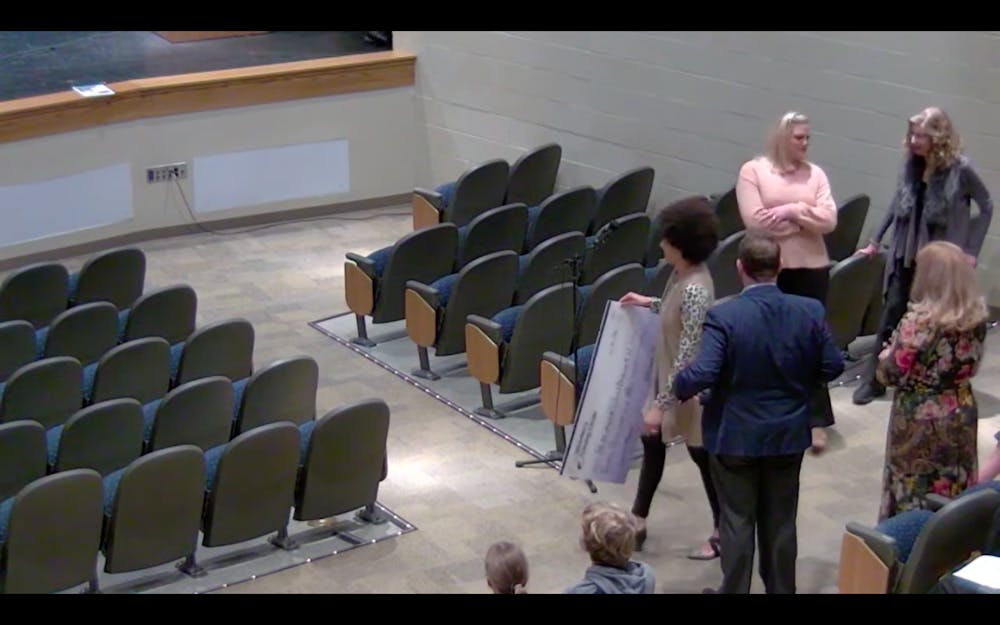The Talawanda School District (TSD) Board of Education passed the single-tier busing proposal with a 3-2 vote at its March 17 meeting. The board also voted unanimously to reject the school-banding proposal.
The board’s decision means the single-tier busing system will be put into effect for the 2023-24 school year, while the current K-5 systems for the three elementary schools will remain the same.
Those who voted yes for the busing proposal cited the fiscal necessity of the decision.
“We do probably spend more than Ross or other school districts, that’s true, but we offer more,” Pat Meade, president of the board, said. “As much as I know, all these cuts will affect our students, they still have to be made.”
Rebecca Howard, vice president of the board, voted no for the busing proposal. She said she had concerns about the details of the plan, such as drop-off points and hubs, that could be worked differently.
“While I want to save as much money as we can, I want to make sure we’re doing it in a way that is responsible, safe and has considered all the logistics,” Howard said. “With our [current] cuts, we’ve already met our goal for the 2023-24 school year without doing anything to transportation.”
Howard also noted the socioeconomic implications of the plan’s exclusion of students living within a two-mile radius of their school from receiving busing.
“I will not support any plan that has a two-mile limit on it,” Howard said. “It’s not equitable to our low-income families.”
Busing is currently not provided to students who live within one mile of their schools.
Another issue raised was the length of time students will spend on the bus. Ed Theroux, superintendent of TSD, said the longest route a student could spend traveling on a bus is currently about an hour. With the single-tier plan, it could be closer to 90 minutes.
“We could have children for 90 minutes, before even stepping foot in a school, on a bus,” David Bothast, a board member who voted no for the plan, said.
For the grade-banding proposal, the board cited lack of information about how the new system would impact both the district’s finances as well as teachers and students as their reasons for voting against it.
Enjoy what you're reading?
Signup for our newsletter
“I’d like to discuss a motion to have leadership take this proposal and improve it,” Kathleen Knight-Abowitz, a board member, said. “Take the concerns that were raised, get input from teachers, staff, the busing company, and see how it can be improved.”
The motion was seconded, and the proposal will be sent back to the superintendent for revision. The board hopes to discuss the proposal again in the fall, once adequate information has been provided.
Because the busing proposal was passed, next year will offer an opportunity to see if that system is effective before introducing grade-banding.
“As I understand it, the banding cannot work unless the busing works, and since we’re doing the busing next year, if it blows up we can probably stop investigating the banding,” Meade said.
Also at the meeting, the McCullough-Hyde Memorial Hospital Women’s Giving Circle presented a $12,000 check to assist lunch debt in Talawanda schools.
Mary Bennett, chief development officer of the McCullough-Hyde Foundation, helped start the Women’s Giving Circle in August 2022.
“We wanted to make an impact in the community in a new and different way, and particularly we wanted to engage the women in our community,” Bennett said. “We are sharing our philanthropic goals, we are endorsing the power of collective giving and we’re coming together to decide how to make the best impact for women, children and families.”
Bennet said the Giving Circle, which has 32 members, wanted to help children in the community and chose relieving school lunch debt after hearing how it impacts students.
The $12,000 came from a combination of donations received from the Giving Circle.




